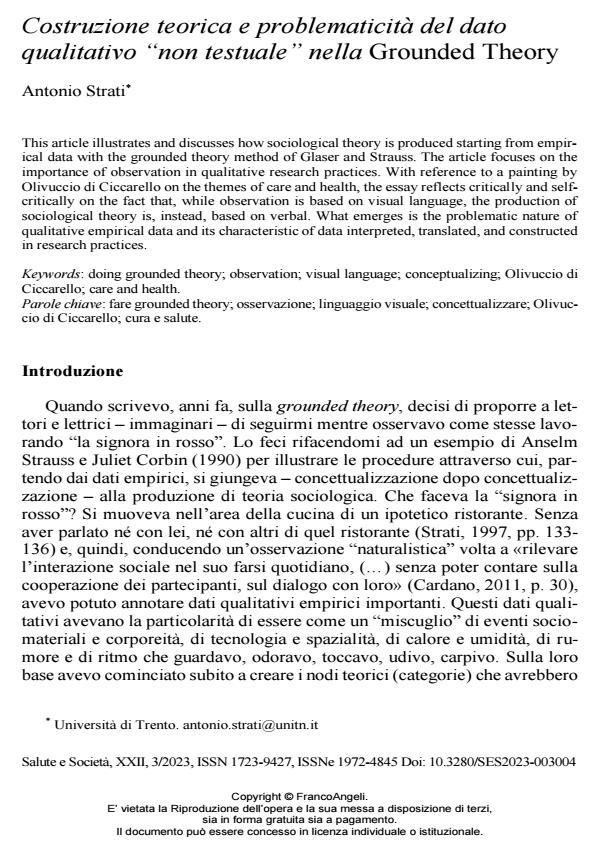Costruzione teorica e problematicità del dato qualitativo "non testuale" nella Grounded Theory
Journal title SALUTE E SOCIETÀ
Author/s Antonio Strati
Publishing Year 2023 Issue 2023/3 Language Italian
Pages 11 P. 47-57 File size 538 KB
DOI 10.3280/SES2023-003004
DOI is like a bar code for intellectual property: to have more infomation
click here
Below, you can see the article first page
If you want to buy this article in PDF format, you can do it, following the instructions to buy download credits

FrancoAngeli is member of Publishers International Linking Association, Inc (PILA), a not-for-profit association which run the CrossRef service enabling links to and from online scholarly content.
This article illustrates and discusses how sociological theory is produced starting from empiri-cal data with the grounded theory method of Glaser and Strauss. The article focuses on the importance of observation in qualitative research practices. With reference to a painting by Olivuccio di Ciccarello on the themes of care and health, the essay reflects critically and self-critically on the fact that, while observation is based on visual language, the production of so-ciological theory is, instead, based on verbal. What emerges is the problematic nature of quali-tative empirical data and its characteristic of data interpreted, translated, and constructed in re-search practices.
Keywords: doing grounded theory; observation; visual language; conceptualizing; Olivuccio di Ciccarello; care and health.
- Benozzo A., Priola V. (2022). Interrogare la ricerca qualitativa. Pratiche critiche e sovversive. Milano: Raffaello Cortina.
- Bryant A., Charmaz K. (2007). Grounded Theory in Historical Perspective: An Epistemological Account. In: Bryant A., Charmaz K., a cura di, The SAGE Handbook of Grounded Theory. London: Sage.
- Bryant A., Charmaz K., (2019). The SAGE Handbook of Current Developments in Grounded Theory. London: Sage.
- Cardano M. (2011). La ricerca qualitativa. Bologna: Il Mulino.
- Charmaz K. (2000). Grounded Theory: Objectivist and Constructivists methods. In: Denzin N., Lincoln Y., a cura di, Handbook of Qualitative Research (2nd edn). Thousand Oaks-London: Sage.
- Charmaz K. (2006). Constructing Grounded Theory. A Practical Guide through Qualitative Analysis. London: Sage.
- Cipriani R., a cura di (2006). L’approccio qualitativo. Dai dati alla teoria nell’analisi sociologica. Milano: Guerini.
- Cipriani R., a cura di (2008). L’analisi qualitativa. Teorie, metodi, applicazioni. Roma: Armando.
- Clarke A.E. (2005). Situational Analysis: Grounded Theory after the Postmodern Turn. Thousand Oaks: Sage.
- Clarke A.E. (2019). Situating Grounded Theory and situational analysis in interpretive qualitative inquiry. In: Bryant A. e Charmaz K., a cura di, The SAGE Handbook of Current Developments in Grounded Theory. London: Sage.
- Corradi G. (2009). L’evoluzione della Grounded Theory. In: Glaser B.G., Strauss A. L., a cura di, La scoperta della Grounded Theory. Strategie per la ricerca qualitativa. Roma: Armando.
- Di Stefano E. (2017). Che cos’è l’estetica quotidiana. Roma: Carocci.
- Gherardi S., Turner B.A. (1987). Real Men don’t Collect Soft Data. Trento: Quaderni del Dipartimento di Politica Sociale (Ristampato in: Bryman A., Burgess R.G., a cura di, Handbook of Qualitative Research. London: Sage, 1999).
- Glaser B.G., Strauss A.L. (1967). The Discovery of Grounded Theory. Strategies for Qualitative Research. Chicago: Aldine de Gruyter (trad. it.: La scoperta della Grounded Theory. Strategie per la ricerca qualitativa. Roma: Armando, 2009).
- Gobo G. (2005). Ricerca qualitativa e sociologia. In: Dovigo F., a cura di, La qualità plurale. Sguardi transdisciplinari sulla ricerca qualitativa. Milano: FrancoAngeli.
- Goulding C. (2009). Grounded Theory Perspectives in Organizational Research. In: Buchanan D., Bryman A., a cura di, The Sage Handbook of Organizational Research Methods. London: Sage.
- Konecki K. (2019). Visual images and Grounded Theory methodology. In: Bryant A., Charmaz K., a cura di, The SAGE Handbook of Current Developments in Grounded Theory. London: Sage.
- Mazzalupi M. (2008). Precisazioni su Olivuccio di Ceccarello da Camerino. In: De Marchi A., Mazzalupi M., a cura di, Pittori ad Ancona nel Quattrocento. Milano: 24 Ore Cultura.
- Ricolfi L., a cura di (1997). La ricerca qualitativa. Roma: La Nuova Italia Scientifica-Carocci.
- Strati A. (1997). La Grounded Theory. In: Ricolfi L., a cura di, La ricerca qualitativa. Roma: La Nuova Italia Scientifica-Carocci.
- Strati A. (2004). L’analisi organizzativa. Paradigmi e metodi. Roma: Carocci.
- Strati A. (2009). Introduzione all’edizione italiana: La scoperta della Grounded Theory. In: Glaser B.G., Strauss A., a cura di, La scoperta della Grounded Theory. Strategie per la ricerca qualitativa. Roma: Armando.
- Strauss A.L. (2016). Il concetto di mondo sociale. Palermo: Edizioni Kurumuny.
- Strauss A.L., Corbin J. (1990). Basics of Qualitative Research: Grounded Theory Procedures and Techniques. Newbury Park: Sage.
- Tarozzi M. (2008). Che cos’è la grounded theory. Roma: Carocci.
- Tarozzi M. (2019). Coding and translating: Language as a heuristic apparatus. In: Bryant A., Charmaz K., a cura di, The SAGE Handbook of Current Developments in Grounded Theory. London: Sage.
- Tedeschi E. (2005). Sociologia e scrittura. Metafore, paradossi, malintesi: dal campo al rapporto di ricerca. Roma-Bari: Editori Laterza.
- Vicarelli G. (2010). Gli eredi di Esculapio. Medici e politiche sanitarie nell’Italia unita. Roma: Carocci.
Antonio Strati, Costruzione teorica e problematicità del dato qualitativo "non testuale" nella Grounded Theory in "SALUTE E SOCIETÀ" 3/2023, pp 47-57, DOI: 10.3280/SES2023-003004